-
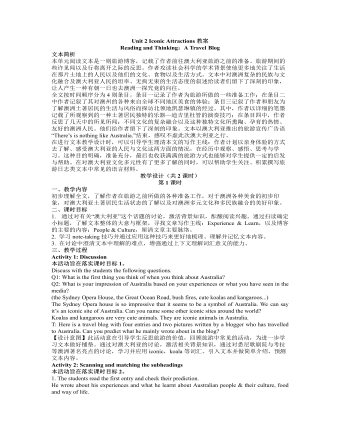
新人教版高中英语选修4Unit 2 Iconic Attractions教案
帮助学生通过讨论与对主题的提升,反思自己的旅游方式,以便做出更优化的安排,在今后的旅程中有更多的收益。 Activity 2: Further discussion of the 6 elements above and supplement of more background knowledge 本活动为实现课时教学目标2。 1.Target Q: The writer’s clear target of traveling, meeting the people and experiencing the culture, is closely related to his major in social studies. Then what is social studies? Social studies is a part of a school or college curriculum concerned with the study of social relationships and the functioning of society and usually made up of courses in history, government, economics, civics, sociology, geography, and anthropology. (Dictionary by Merriam-Webster) Reflection: When you go out to travel, what targets do you usually have in mind? 2.Research Q: Suppose you are traveling to Hangzhou during the school holidays, how will you do research on the city? (surf the internet, read books or travel brochures, consult friends, ...) What information will you be interested to know? (location, iconic sites, local cuisines, interesting customs, shopping malls ...) 3.Abandonment To make the most of time, we have to learn to abandon so that we can accomplish our plan. What will you be interested in doing if you go to Hangzhou if you have a week’s time? What if you only have 2 days? 4~5. Venturing & Experiencing Q: What did he venture to do during the trip? What new experiences did he have? In Sydney: attend his first open-air barbecue, enjoy many different but yummy meals In Catherine: observe the life and customs of the aborigines appreciate their music & try the musical instruments: the didgeridoo
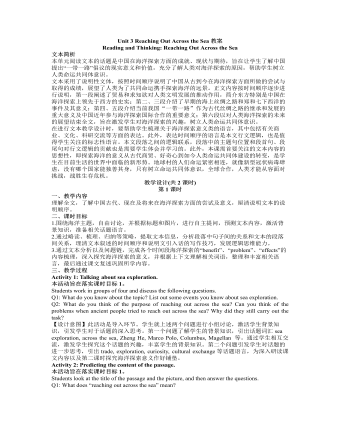
新人教版高中英语选修4Unit 3 Reaching Out Across the Sea教案
本活动旨在落实课时目标3。 Think about the following questions and talk about your own attitude in pairs.Q1: As for this topic,what impresses you the most in the passage?Q2: What do you think of the future of China’s further exploration in sea? Are you in favor of the further exploration?Why or why not? 【设计意图】该活动是一个完全开放性的活动,每个学生都会有不同的答案。运用迁移所学,自由口头表达自己对海洋探索的态度。对于中国海洋探索的未来,每个人的想法是不一样的,有乐观,有担忧,有认为值得投入,也有认为不值得付出太大代价,这里给学生自由表达的空间只要学会有支撑自己观点的事实就可以了,进一步培养学生批判性思维和正确的价值观。 Assignment: 此任务旨在迁移一、二课时所学,培养学生辩证分析问题的能力。 Write about your idea of the future of China’s sea exploration. And add your attitude towards the effort China have made in sea exploration. You’re expected to use the language and the writing technique learnt in the passage.
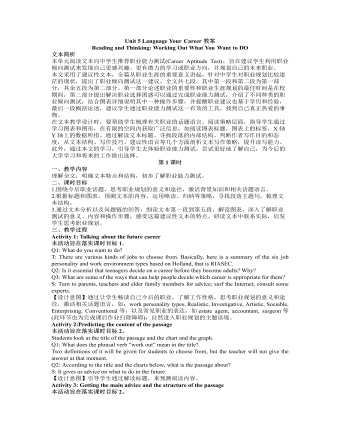
新人教版高中英语选修4Unit 5 Language Your Career教案
本单元阅读文本向中学生推荐职业能力测试(Career Aptitude Test),旨在建议学生利用职业倾向测试来发现自己更感兴趣、更有潜力的学习或职业方向,并规划自己的未来职业。 本文采用了建议性文本,全篇从职业生涯的重要意义讲起,针对中学生对职业规划比较迷茫的现状,提出了职业倾向测试这一建议。全文共七段,其中第一段和第二段为第一部分,其余五段为第二部分。第一部分论述职业的重要性和职业生涯规划的最佳时间是在校期间,第二部分提出解决职业选择困惑可以通过完成职业能力测试,介绍了不同种类的职业倾向测试,结合图表详细说明其中一种操作步骤,并提醒职业建议也基于学历和经验,最后一段概括论述,建议学生通过职业能力测试这一有效的工具,找到自己真正热爱的事物。 在文本教学设计时,要帮助学生梳理有关职业的话题语言。阅读策略层面,指导学生通过学习图表和图形,在有限的空间内获取广泛信息,如阅读图表标题,图表上的标签,X轴Y轴上的数据所指。

新人教版高中英语必修1Unit 2 Travelling Around-Discovering Useful Structure教案
(5)be to do (可以和具体的时间状语连用)①表示按计划、安排即将发生的动作。②用于时间、条件状语从句中,表示“如果要……,想要……”。The students are to meet at the school gate tomorrow. 明天学生们将在学校大门口集会。 If you are to succeed, you must work as hard as possible. 如果你想要成功,比必须努力工作。(6)be about to do (不与具体的时间状语连用) 表示即将要发生的动作。We are about to start. 我们就要出发了。The new school year is about to begin. 新学年开学在即。(7)一般现在时表将来①表示按时间表规定将要发生的动作。常限于表示位置移动的短暂性动词。②在时间、条件或让步状语从句中,用一般现在时表将来。Look at the timetable. Hurry up! Flight 4026 takes off at 18:20. 你看看时刻表,快点!4026次航班的起飞时间是下午6点20分。Jane is in a hurry because the train to the airport leaves in half an hour. 简很匆忙,因为去机场的火车半小时后出发。

新人教版高中英语必修1Unit 2 Travelling Around-Reading for Writing教案
Is there a clear purpose for the trip? :Does each paragraph have a clear main idea? Does the writer use the present continuous tense for future plans?Does the writer use commas, stops, and question marks correctly? Are all the words spelt correctly?Are all the proper nouns capitalized?Revise your draft according to your partner's comments.Step 5:The summary of how to write a travel plan.旅游计划是一种常见的应用文写作。旅游可分为观光游、文化游、美食游及探险游等不同类型,因此旅游计划也要根据不同的旅游目的进行设计。常规的旅游计划需要明确以下几个方面的问题:Travel planWhen will you leave for? Where is your the destination?How will you get there?What will you do there?How long will you there?Is there a clear purpose for the trip? 为了提升旅行计划的层级,还需注意以下几个方面的问题:1.每段是否有明确清晰的主题;2.用一般现在时代替一般将来时;3.用更高级的形容词词汇。例如:表达“好”时,不要总用“nice”,我们还可以用“smart, clean, excellent, exciting, beautiful, wonderful, clever, famous, grand”等表达更具有指向性的词汇;4.用更高级的动词词汇。比如:我们可以用“seem stand, lie .get stay, remain, look . sound, become . keep, grow”等代替"be";
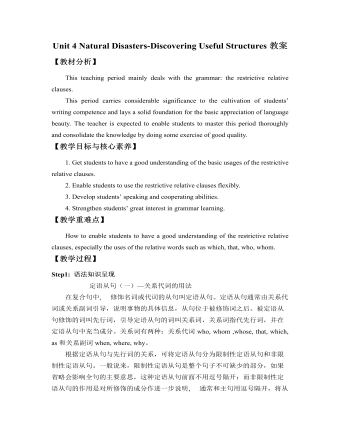
新人教版高中英语必修1Unit 4 Natural Disasters-Discovering Useful Structures教案
【教材分析】This teaching period mainly deals with the grammar: the restrictive relative clauses.This period carries considerable significance to the cultivation of students’ writing competence and lays a solid foundation for the basic appreciation of language beauty. The teacher is expected to enable students to master this period thoroughly and consolidate the knowledge by doing some exercise of good quality.【教学目标与核心素养】1. Get students to have a good understanding of the basic usages of the restrictive relative clauses.2. Enable students to use the restrictive relative clauses flexibly.3. Develop students’ speaking and cooperating abilities.4. Strengthen students’ great interest in grammar learning.【教学重难点】How to enable students to have a good understanding of the restrictive relative clauses, especially the uses of the relative words such as which, that, who, whom.【教学过程】Step1: 语法知识呈现定语从句(一)—关系代词的用法在复合句中, 修饰名词或代词的从句叫定语从句。定语从句通常由关系代词或关系副词引导,说明事物的具体信息,从句位于被修饰词之后。被定语从句修饰的词叫先行词,引导定语从句的词叫关系词,关系词指代先行词,并在定语从句中充当成分。关系词有两种:关系代词who, whom ,whose, that, which, as和关系副词when, where, why。
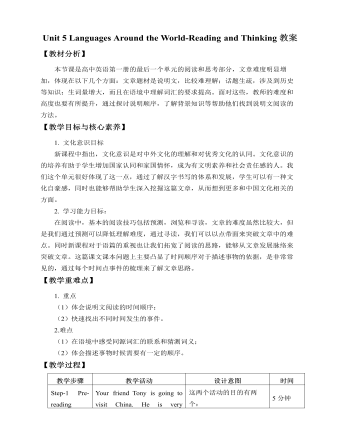
新人教版高中英语必修1Unit 5 Languages Around the World-Reading and Thinking教案
【教材分析】本节课是高中英语第一册的最后一个单元的阅读和思考部分,文章难度明显增加,体现在以下几个方面:文章题材是说明文,比较难理解;话题生疏,涉及到历史等知识;生词量增大,而且在语境中理解词汇的要求提高。面对这些,教师的难度和高度也要有所提升,通过探讨说明顺序,了解背景知识等帮助他们找到说明文阅读的方法。【教学目标与核心素养】1. 文化意识目标新课程中指出,文化意识是对中外文化的理解和对优秀文化的认同。文化意识的的培养有助于学生增加国家认同和家国情怀,成为有文明素养和社会责任感的人。我们这个单元很好体现了这一点,通过了解汉字书写的体系和发展,学生可以有一种文化自豪感,同时也能够帮助学生深入挖掘这篇文章,从而想到更多和中国文化相关的方面。2. 学习能力目标

新人教版高中英语必修2Unit 1 Cultural Heritage-Discovering Useful Structure教案一
This teaching period mainly deals with grammar “restrictive relative clauses.” To begin with, teachers should lead students to revise what they have learned about the relative pronouns and relative adverbs. And then, teachers move on to stress more special cases concerning this grammar, such as the “preposition+ relative pronouns which and whom” and cases where we can omit the relative pronouns. This period carries considerable significance to the cultivation of students’ writing competence and lays a solid foundation for the basic appreciation of language beauty. The teacher is expected to enable students to master this period thoroughly and consolidate the knowledge by doing some exercises. 1. Guide students to review the basic usages of relative pronouns and adverbs of attributive clauses.2. Lead students to learn to use some special cases concerning restrictive relative clauses flexibly.2. Enable students to use the basic phrases structures flexibly.3. Strengthen students’ great interest in grammar learning.1. Help students to appreciate the function of relative pronouns and adverbs of attributive clauses in a sentence2. Instruct students to write essays using the proper relative pronouns and adverbs of attributive clauses.本节语法思考:定语从句在复合句中的作用是什么? 关系词有哪些?定语从句在复合句中的作用相当于形容词,它在句中作定语修饰名词或代词。他们在先行词和定语从句之间起到联系作用,同时在意义上代表先行词并在定语从句中担任一个成分。被定语从句所修饰的词称先行词,定语从句一般放在先行词的后面。
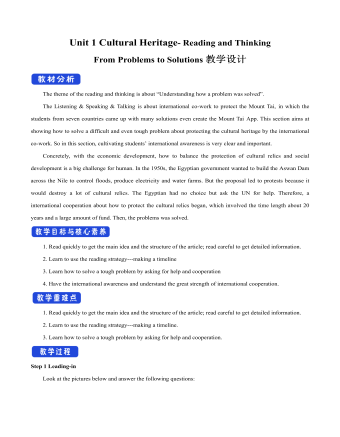
新人教版高中英语必修2Unit 1 Cultural Heritage-Reading and Thinking教案一
The theme of the reading and thinking is about “Understanding how a problem was solved”.The Listening & Speaking & Talking is about international co-work to protect the Mount Tai, in which the students from seven countries came up with many solutions even create the Mount Tai App. This section aims at showing how to solve a difficult and even tough problem about protecting the cultural heritage by the international co-work. So in this section, cultivating students’ international awareness is very clear and important. Concretely, with the economic development, how to balance the protection of cultural relics and social development is a big challenge for human. In the 1950s, the Egyptian government wanted to build the Aswan Dam across the Nile to control floods, produce electricity and water farms. But the proposal led to protests because it would destroy a lot of cultural relics. The Egyptian had no choice but ask the UN for help. Therefore, a international cooperation about how to protect the cultural relics began, which involved the time length about 20 years and a large amount of fund. Then, the problems was solved. 1. Read quickly to get the main idea and the structure of the article; read careful to get detailed information.2. Learn to use the reading strategy---making a timeline3. Learn how to solve a tough problem by asking for help and cooperation4. Have the international awareness and understand the great strength of international cooperation.1. Read quickly to get the main idea and the structure of the article; read careful to get detailed information.2. Learn to use the reading strategy---making a timeline.3. Learn how to solve a tough problem by asking for help and cooperation.

新人教版高中英语必修2Unit 2 Wildlife Protection-Listening and Speaking教案
This lesson is about wildlife protection. The listening and speaking is about “How to protect endangered wildlife ?” Faced with the facts and numbers of wildlife loss, people begin to detect the reasons, then people such as the celebrities (Prince William and Yao Ming) are calling on to protect them. So students are guided to enhance the awareness of protecting wildlife and try to take part in some volunteer activities of protecting wildlife.1. Predict the content by using visuals. 2. Learn to use the sentences such as “I’m concerned about.... But now they are in danger. I want to know the reasons/why./ What can we do to protect them ?3. Learn from the stars like Prince William and Yao Ming and enhance the awareness of protecting wildlife.4. Guide students to try to put forward the solutions to the problems of wildlife protection and then discuss them with partners and present the results of discussion.5. Master the pronunciation of stressed syllables.1. Learn from the stars like Prince William and Yao Ming and enhance the awareness of protecting wildlife.2. Guide students to try to put forward the solutions to the problems of wildlife protection and then discuss them with partners and present the results of discussion.3. Learn to use the sentences such as “I’m concerned about.... But now they are in danger. I want to know the reasons/why./ What can we do to protect them ?4. Master the pronunciation of stressed syllables.Part A Listening and Speaking--- How to save endangered wildlifeStep 1 Lead in1. Point at the pictures on P14 and ask Q1: What message do these posters share?

新人教版高中英语必修2Unit 3 The Internet-Listening &Speaking&Talking教案二
From the pictures in the text and the title--- choose the best app, we can know that this part is about how to save money by using apps.Step 2 While-listening1. Laura and Xiao Bo are talking about apps. Listen to their conversation and find out what apps they want.Xiao Bo is looking for a(n) exercise app to help him get in shape.Laura would like an app for getting rich and another that will make her grades better.2. Listen again. Are the sentences true T or false F?1). Both of Xiao Bo's apps keep track of the steps he takes._____2). Xiao Bo's second app can help him make a fitness plan._____3). Laura needs an app that will help her get discounts.______4). Laura needs an app that will add money to her bank account._______F T F T3. Listen once more and tick the sentence you hear. Underline the words used to express predictions, guesses, and beliefs.Predictions, Guesses, and Beliefs________It might help me walk more.________My guess is that it wouldn't work.________I imagine this app would help me get fit faster________I suppose that would be good.________I guess you could save a little with this app.________I suppose there would be some problems, too.________I believe this app could help me get thinner.

新人教版高中英语必修2Unit 4 History and Traditions-Listening&Speaking&Talking教案一
This unit is about history and traditions. From the opening page, we can know that this unit will introduce the history and traditions around the world. As Marcus Garvey says “A people without the knowledge of their past history, origin and culture is like a tree without roots”, it is important for students to realize the importance and value of knowing the history and traditions and their further meanings. And this part ( listening and speaking ) is divided into two parts: Part A---share views on historic sites, Part B ---talk about a visit to a historic tourist destination. By talking with a foreigner, the speakers introduce the historic attractions and their cultures. Part A is that William, a British student, who was going to visit the Confucius Temple and a Chinese student, Xiao Kong, who was going to the Confucius Temple to meet with the members of the research group, went together and exchanged their views on the Confucius Temple, Confucius, Confucius' descendants and Confucius' educational thoughts. Part B is a conversation between Xiao Yan, a youth hostel receptionist and Paul, a backpacker about the feelings and experience after visiting the Chinese famous tourist attraction Pingyao.1. Guide students to understand the content of listening texts in terms of the whole and key details; 2. Cultivate students' ability to guess the meaning of words in listening; discuss with their peers how to talk about historic spots and great person.3. Instruct students to use functional sentences of showing one’s excitement, surprise and disappointment.1. Guide students to understand the content of listening texts in terms of the whole and key details; 2. Cultivate students' ability to discuss with their peers the related topics.3. Enable students to use the functional items of showing one’s excitement, surprise and disappointment.

新人教版高中英语必修2Unit 4 History and Traditions-Listening&Speaking&Talking教案二
Listening and Speaking introduces the topic of “Take part in a youth project”. The listening text is an interview about "sharing views on historical sites". Through listening to a dialogue between Chinese and foreign students on the way to the Confucius Temple, students can understand their views on the Confucius Temple, Confucius, Confucius' descendants and Confucius' educational thoughts, so as to realize and think about the profound influence of Confucius and his thoughts on Chinese historical tradition. At the same time, the dialogue naturally integrates English idioms and mentions Shakespeare, the British playwright, so as to provide language materials and context for students to understand English idioms and related cultural allusions, as well as to compare Chinese and foreign cultures, which is helpful for students to understand and express the language such as history, tradition, culture and custom significant impact.Text analysis: listening text is a dialogue between a British student and a Chinese student when he goes to the Confucius Temple. When William, a British student, visited the Confucius Temple, he asked Xiao Kong, a Chinese student, for directions. Xiao Kong was just going to the Confucius Temple to meet with the members of the research group, so they went together and exchanged their views on the Confucius Temple, Confucius, Confucius' descendants and Confucius' educational thoughts. From the perspective of foreign tourists, this paper describes their thoughts on Confucius, the great son of Confucius, who had a profound impact on Chinese history and cultural tradition, and his education.Listening and Talking introduces a visit to a historic tourist destination. Tourism is a common way to understand a country's history, culture, and customs and so on. Students listen to the dialogue between Xiao Yan, a youth hostel Usher, and Paul, a backpacker, to learn about Pingyao's famous historical and cultural attractions and Paul's travel experience and experience as a foreign tourist.

新人教版高中英语必修2Unit 5 Music-Listening&Speaking&Talking教案
choir memberspeople to run food stands people to sell festival ticketspeople to sell music CDspeople to set up equipmentmusical performersStep 2: Listen to the announcement again and answer the questions. ? 1. What kind of songs will Grace Davis sing at the festival?? 2. Who can try out as a performer?? 3. What can those who think they do not have musical talent do?? 4. How can students volunteer to take part?? Talking about preferences:? Would you prefer doing ..?? What would you prefer to do?? Would you rather do .... or ….?? What would you rather do?? I'd prefer .... to ..? I'd rather have ... than .. Step 3: Speaking ProjectWork in groups. Role-play the conversation or make a new one.? Debbie: Where have you been? You missed the announcement about the music festival.? John: I was at the doctor's office. Music festival?? Frank: Yes, it's going to be next month on the school sports field. John, you can play the piano. How about playing it at the festival?? John: Well, I'd rather play the violin. I can play Liang Zhu.? Frank: Wow! Sounds good. What about you, Debbie? ? Debbie: Actually, I don't have much musical ability. I'd prefer just to help out with the crowds.? Frank: You can sell tickets or work at a food stand.? John: So can I assume that the aim of the festival is to raise money?? Debbie: Yes. All of the money will go to charity.

新人教版高中英语必修2Unit 5 Music-Reading for Writing教案二
The Internet celebrity Gao Yifeng. Years ago, he owned 5 companies and the staffs over 1,000, but during the economy crisis, he became nothing but debt. He was so worried that his hair became white overnight. There was a time when he wanted to killed himself. But after listening to the song Start Over by Liu Huan, he decided to cheer himself up. He started a steamed bun shop and gradually became a national chain shops. Now he became successful again.Walter Haddon said, “Music is the medicine of a troubled mind.” Music contains such a pleasant and inspiring force. Music gave him courage and bravery. When he listened to the song, it made his spirit fly like a kite in the wind. Music gave him strength and brought him relief. It was the rock I leant on to become strong and to get through those hard times. I hope none of us have to go through the same kind of suffering that he did. At the same time, we all go through various periods when we feel sad or alone. During those times, music can help us in the same way that it helped him. I hope we all will somehow begin to treasure music and make it a part of our life. Thank you for your listening !5.Revise your writing each other.Does he/she explain how music has changed his/her/someone else’s life?Are some of the rhetorical devices included and used properly ?Does he/she talk about how music makes him/her/someone feel?Is the first word in each sentences capitalised?Does he/she use correct punctuation ?
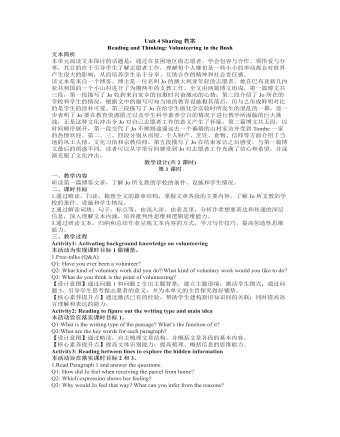
新人教版高中英语选修4Unit 4 Sharing教案
【核心素养提升点】学会将抽象信息进行可视化表达,提高信息处理能力和分析、推理等高阶思维品质;在跨文化交际中学会以国际视野接受和包容不同的文化。 5.Read Paragraph 2, draw a mind map and answer the questions. Q1:What did Jo learn about Tombe’s life? Q2:What kind of life do the natives lead? Read paragraph 2-5 and draw a mind-map. (Focus on accommodation, possession, diet and belief) 【设计意图】引导学生利用思维导图和问题链等形式来厘清当地人的生活方式,更好地处理和归纳信息 【核心素养提升点】提高信息处理能力、分析和归纳能力,包容异国文化、扩展国际视野。 6.Read Paragraph 3 and answer the questions. Q1:What was Jo’s feeling upon arriving her own home? Q2:Why would she feel that way? Q3:Do you think “It was such a privilege to have spent a day with Tombe’s family”? 【设计意图】通过提问,让学生理解Jo的苦并快乐的心情,并通过对“It was such a privilege to have spent a day with Tombe’s family”这句话的理解,体验志愿者生活的伟大。 【核心素养提升点】学会对信息的综合和归纳,从而理解作者所表达的观点。 Activity4: Summarize the change of Jo's feelings
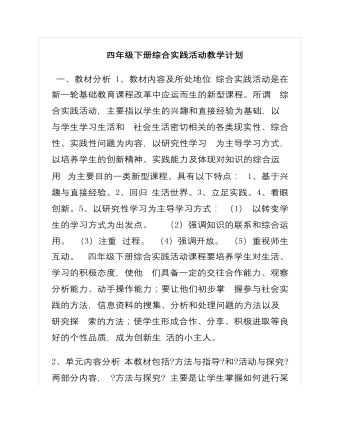
四年级下册综合实践活动教学计划及教案
一、教材分析 1、教材内容及所处地位综合实践活动是在新一轮基础教育课程改革中应运而生的新型课程。所谓综合实践活动,主要指以学生的兴趣和直接经验为基础,以与学生学习生活和社会生活密切相关的各类现实性、综合性、实践性问题为内容,以研究性学习为主导学习方式,以培养学生的创新精神、实践能力及体现对知识的综合运用为主要目的一类新型课程。具有以下特点: 1、基于兴趣与直接经验。2、回归生活世界。3、立足实践。4、着眼创新。5、以研究性学习为主导学习方式:(1)以转变学生的学习方式为出发点。(2)强调知识的联系和综合运用。(3)注重过程。(4)强调开放。(5)重视师生互动。四年级下册综合实践活动课程要培养学生对生活、学习的积极态度,使他们具备一定的交往合作能力、观察分析能力、动手操作能力;要让他们初步掌握参与社会实践的方法,信息资料的搜集、分析和处理问题的方法以及研究探索的方法;使学生形成合作、分享、积极进取等良好的个性品质,成为创新生活的小主人。2、单元内容分析本教材包括?方法与指导?和?活动与探究?两部分内容, ?方法与探究? 主要是让学生掌握如何进行采访,通过一系列活动,掌握采访的准备、注意事项、具体实施,及最后的交流总结,培养学生交往能力。 ?活动与探究?包括六个主题,主题一我们身边的标志,通过让学生认识标志,体会含义。学会分类,最后学会制作标志,循序渐进,蕴含了创新、守规、审美等能力的培养;主题二早餐与健康通过谈论,调查、分析讨论培养学生交流总结能力,树立健康生活意识;主题三,有趣的丝网花,通过制作培养学生合作、审美、动手能力;主题四巧手做风筝继续对学生进行培养;主题五植物的扦插与嫁接,与现实生活联系密切,通过活动掌握方法,体验快乐,体验劳动的乐趣;主题六争做小小志愿者,通过了解体验志愿者的活动,丰富阅历,培养学生的服务意识,自身获得提升与发展。教材的重点、难点:重点:学会交流,提升能力;认识各种标志,学会制作;学会健康的生活;通过制作丝网花、风筝、植物的扦插于嫁接,学会制作,提高动手能力,通过体验小小志愿者,提高服务意识。难点:教学中让学生亲身参与、主动实践,在实践中综合运用所学知识解决各种实际问题,提高解决实际问题的能力。学习基础:四年级学生已具备了一定的实践能力,因此要逐步培养学生一些探究问题的方法,提高学生的动手意识,能够从生活和学习中挖掘自己感兴趣的活动主题,能够试着和同学展开小组合作学习,在有效的活动中不断提高学生的动手与创新的潜能。
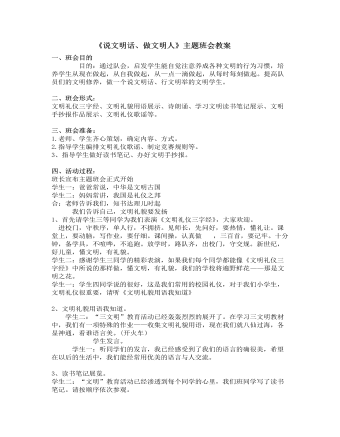
《说文明话, 做文明人》主题班会教案
2、文明礼貌用语我知道。学生二:“三文明”教育活动已经轰轰烈烈的展开了。在学习三文明教材中,我们有一项特殊的作业——收集文明礼貌用语,现在我们就八仙过海,各显神通,看谁语言美。(开火车)学生发言。学生一:听同学们的发言,我已经感受到了我们的语言的确很美,希望在以后的生活中,我们能经常用优美的语言与人交流。3、读书笔记展览。学生二:“文明”教育活动已经渗透到每个同学的心里,我们班同学写了读书笔记。请按顺序依次参观。4、文明手抄报展览。5、为获奖同学颁发奖状。(自制奖状)学生一:我们学了那么多,最终目的就是让我们“说文明话,行文明举,做文明人”。请欣赏〈文明礼仪歌谣〉
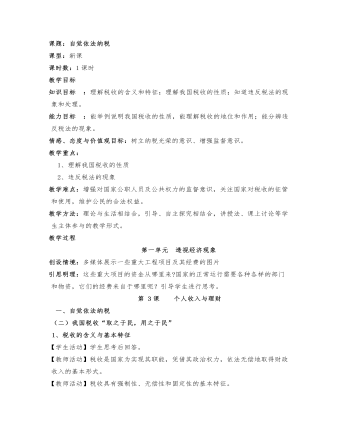
八年级思想政治下册自觉依法纳税教案
一、自觉依法纳税(二)我国税收“取之于民,用之于民” 1、税收的含义与基本特征 【学生活动】学生思考后回答。 【教师活动】税收是国家为实现其职能,凭借其政治权力,依法无偿地取得财政收入的基本形式。 【教师活动】税收具有强制性、无偿性和固定性的基本特征。[1]强制性:不管你愿意还是不愿意,都必须交税。[2]无偿性:交了税,没有补偿,更不会返还。[3]固定性:征税是有标准的,不是无止境的,按标准收到一定数量即算完成纳税。 2、税收的性质 【教师活动】展示多媒体图片,观察税收性质是什么? 【学生活动】分析图片,税收的性质。 【教师活动】每个人都与税收紧密地联系在一起,我们天天享受到的公共物品,无不有赖于税收。接受教育要有学校,看病要有医院,出行要有道路,保障国家安全要有国防,防洪、发电要有水利工程,这些都要依靠国家的税收来为公众提供公共服务。 【教师活动】播放国家免费为新冠肺炎患者治疗的视频。 【教师活动】劳动人民是税收的最终受益者,我国的税收是取之于民、用之于民的新型税收。
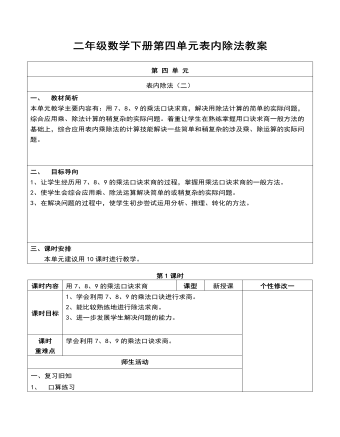
二年级数学下册第四单元表内除法教案
1、 谈话引入新课六一快到了。小朋友们在老师的带领下忙着布置自己的教室呢!可是他们遇到了一些数学上的问题,你能帮他们一快解决吗?2、教学例1。(1)、投影出示主题图引导学生仔细观察。说说他们遇到了什么问题?(2)、引导学生解决问题并列出算式。板书:56÷8(3)、引导学生得出算式的商。问:你是怎么计算的?(想乘算除)(4)、学生独立解决:要是挂7行呢?你能够解决吗?学生说出自己的计算结果,并把求商的过程跟大家说一说。2、 小结:在今天的学习中我们不仅帮小朋友们解决了数学问题,而且还进一步学会了利用乘法口诀来求商。在以后的除法中只要大家能够熟记口诀,就能很快算出除法的商了。